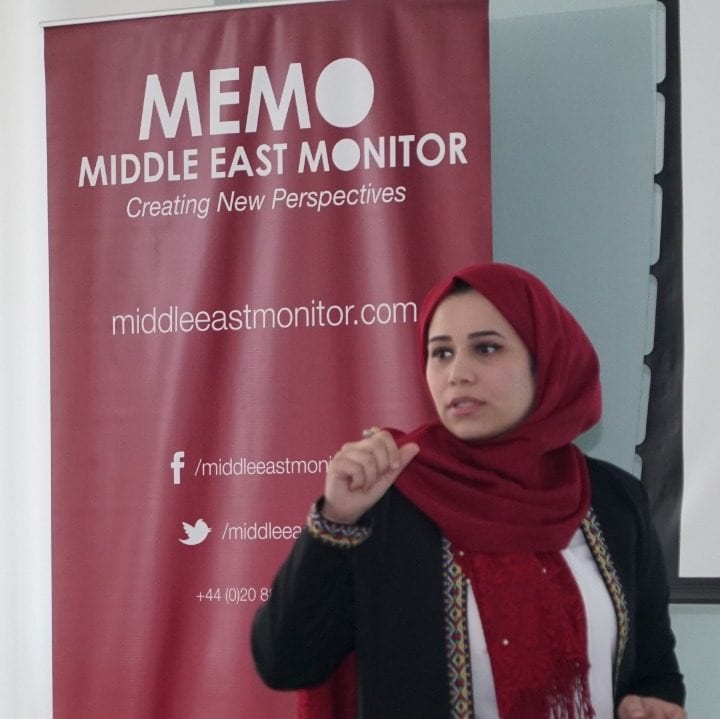Cultural appropriation is just one way in which the Israeli occupation seeks to eradicate Palestinian heritage. This is very obvious when it comes to food, with hummus being claimed as an “Israeli” dish, for example. In fact, the backstory of Palestinian grandparents’ favourite dishes is often erased in the Zionist narrative imposed upon occupied Palestine. Food, therefore, is a very popular way to preserve Palestinian culture and heritage, as Palestinian Chilean Chef Sofia Halabi explained to me recently.
“I try to keep our Palestinian heritage alive on the other side of the world through our cuisine,” she said. “It’s is an essential part of who we are, and is an ideal way of remembering our roots.”
Halabi feels responsible for preserving the culinary traditions that are latent in the newer generations of Palestinians in the South American diaspora. She believes that cooking traditional dishes is an essential medium for the retention of cultural knowledge.
Living in Santiago, Halabi learned to cook as a child in the kitchen with her mother and grandmother. As she grew up, she looked into her family history and their special way of cooking. This made her keen to research deeper into her roots.
READ: The ‘I Hear U’ project builds medical bridges between Brazil and refugees
“I am a descendant of Palestinian migrants who arrived on a boat from Yaffa and dedicated themselves to the textile industry in Chile, as many other Palestinians did. I am a second generation Chilean.”
When her grandmother passed away, Halabi realised that the mantle had been passed to her to keep the traditions of Palestinian cooking alive for the current and next generation. She has devoted herself to promote Palestinian food in the largest Palestinian community in Latin America through prepared meals and food events.
In doing so, she has founded the “Cocina Palestina” project: the Palestinian Kitchen. Its objective is to preserve endangered Palestinian cuisine and thus, it is hoped, help to preserve the identity, history and culture of the people of occupied Palestine. She sees it as a form of resistance against the occupation and Israel’s cultural appropriation.
Palestinian hospitality is world renowned because food is one way that those in the diaspora can express who they are, and the Palestinians in Chile are no different to other migrants in having taken their food with them. There has been a Palestinian community in Chile since the middle of the 19th century, and they have introduced a rich cultural legacy in the country, not least their cuisine. It is widespread in Chilean society, with its distinctive flavours of its spices and the quality and variety of ingredients. Maqluba or falafel, and even hummus, are always present on the Chilean dining table.
The so-called “Chilestinians” provide a living example of the true strength of the collective Palestinian identity that existed before Israel was violently imposed on the Middle East, and continues to exist in exile. Chile is home to the largest, and one of the oldest, Palestinian communities outside the Arab world, with around 500,000 members.
“Our culture has become a part of Chile’s culture for many years and has an important value in the country. Club Deportivo Palestino is a professional football club in Santiago playing in the top division. It is known all over the world. The Palestinian community in Chile has been incorporated into the country for more than a century through the economy, business, industry and politics.”
Halabi visited the West Bank for the first time in 2019; it was a milestone in her life. “In 2019,” she told me, “I undertook a trip that I had dreamed of all my life. I wanted to know where my grandparents were born. I went to Palestine with the purpose of eating the local food and knowing everything related to my roots. I met my family, aunts and cousins, and saw the house where my grandfather was born in Bethlehem.”
This trip brought the realisation that Palestinian cuisine is the essence to which she wants to dedicate her life. Back in Chile, she started to prepare traditional Palestinian food with her sister Dalal, and together they have made pop-up meals for their customers.
While she was talking to me, Halabi was preparing to represent Palestine at Chile’s 8th International Festival of Tourism and Gastronomy, which started a few days ago and continues to the end of the month. This is the first time that Palestinians have a prominent presence at the festival, which was born out of the desire of immigrant communities to preserve their heritage and share their cultures.
Chef Sofia Halabi presents typical dishes from cities such as Nablus, Beit Jala and Taybeh, as well as Jerusalem. “I am very excited to be Palestine´s ambassador at the festival, because it is the first time that we have been invited.”
Her pride is palpable, because she is representing the whole Palestinian community. “I want Chile and the rest of the world to know who we are and that we have an ancestral gastronomic culture,” she concluded.
Keeping Palestinian heritage alive through her food is something that she takes very seriously indeed. I for one am happy that she does.


![Chef Sofia Halabi is representing Palestine at Chile's 8th International Festival of Tourism and Gastronomy, February 2022 [Sofia Halabi]](https://i0.wp.com/www.middleeastmonitor.com/wp-content/uploads/2022/02/Chef-Sofia-Halabi-is-representing-Palestine-at-Chiles-8th-International-Festival-of-Tourism-and-Gastronomy-February-2022Photo-Sofia-Halabi.jpg?fit=1199%2C800&ssl=1)

![274102431_673009924052100_1096897855950292518_n [Sofia Halabi]](https://i0.wp.com/www.middleeastmonitor.com/wp-content/uploads/2022/02/274102431_673009924052100_1096897855950292518_n.jpg?w=334&h=303&ssl=1)
![167742005_797439331131201_6452481064017575710_n [Sofia Halabi]](https://i0.wp.com/www.middleeastmonitor.com/wp-content/uploads/2022/02/167742005_797439331131201_6452481064017575710_n.jpg?w=243&h=303&ssl=1)
![165981139_435293747562684_3397245764874708532_n [Sofia Halabi]](https://i0.wp.com/www.middleeastmonitor.com/wp-content/uploads/2022/02/165981139_435293747562684_3397245764874708532_n.jpg?w=304&h=303&ssl=1)
![98320584_549576992376542_6184738133180064202_n [Sofia Halabi]](https://i0.wp.com/www.middleeastmonitor.com/wp-content/uploads/2022/02/98320584_549576992376542_6184738133180064202_n.jpg?w=303&h=303&crop=1&ssl=1)








